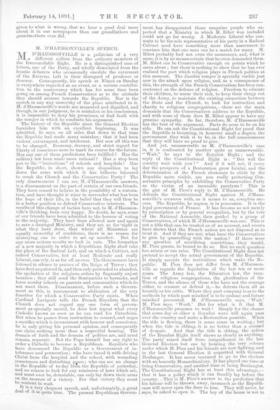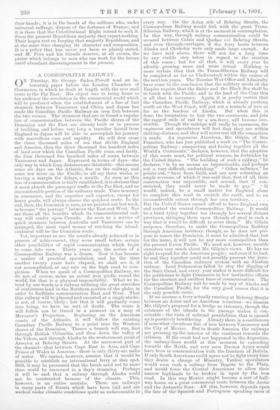M. D'HAUSSONVILLE'S SPEECH.
D'HAUSSONVILLE is a politician of a very • different calibre from the ordinary members of the Irreconcilable Right. Ho is a distinguished man of letters, one of the Forty, and wholly dissociated from the frantic debaters who occasionally emulate the extremest of the Extreme Left in their disregard of prudence or decency. Consequently, his speech at Nimes on Sunday is everywhere regarded as an event, as a serious contribu- tion to the controversy which has for some time been going on among French Conservatives as to the attitude they should assume towards the Republic. Nor is the speech in any way unworthy of the place attributed to it. M. d'Haussonville's words are measured and dignified, and though, in our judgment, he is mistaken in his conclusions, it is impossible to deny his premisses, or find fault with the temper in which he conducts his argument. The history of the Republic since the General Election furnishes him with an excellent beginning. It was admitted, he says, on all sides that down to that time the Republic had made many mistakes ; that it had been violent, extravagant, and intolerant. But now all this was to be changed. Economy, decency, and strict regard for liberty of conscience were to mark its course for the future. Has any one of these predictions been fulfilled ? Has the military law been made more rational P Has a stop been put to the laicisations " of schools and hospitals ? Has the Republic, in short, shown any disposition to lay down the arms with which it has hitherto laboured to crush the Church and the Conservative Party ?. The only disarmament I can see, M. d'Haussonville answers, is a disarmament on the part of certain of our own friends. They have ceased to believe in the possibility of a restora- tion, and have thought it wiser to surrender what has been the hope of their life, in the belief that they will thus be in a better position to defend Conservative interests. The results of this change of tactics have not, to M. d'Hausson- ville's thinking, been very happy. No doubt, he says, some of our friends have been admitted to the honour of voting in the majority. They have been allowed now and again to save a damaged Ministry, and they are so far 'right in what they have done, that where all Ministries are equally unworthy of confidence, there is no reason for destroying one in order to set up another. But for any more serious results we look in vain. The formation of a new majority in which a Republican Right shall take the place of the Radical Left, and on which a Cabinet, not indeed Conservative, but at least Moderate and really Liberal, can rely, is as far off as ever. The Government have listened in silence to praises of the Reign of Terror ; they have first acquiesced in, and then only pretended to abandon, the spoliation of the religious orders by flagrantly unjust taxation ; they still send the Seminarists to barracks, and force secular schools on parents. and communities which do not want them. Disarmament, before such a Govern- ment as this, is tantamount to abdication of the very function for which a Conservative Party exists. When Cardinal Lavigerie tells the French Royalists that the Church does not regard any one form of govern- ment as specially sacred, he does but repeat what every Catholic knows as soon as he can read his Catechism. But when he passes from instruction to counsel, and urges a sacrifice which is inconsistent with honour and conscience, he is only giving his personal opinion, and consequently can claim nothing more than a respectful hearing. The domain of faith and the domain of politics are, and must remain, separate. Not the Pope himself has any right to order a Catholic to become a Republican. Royalists who have denounced the Republic as a Government of in- tolerance and persecution ; who have taxed it with driving Christ from the hospital and the school, with wounding c. onsciences and disturbing 'lace ; who can see no change in the Republic of to-day from the Republic of yesterday, and no reason to look for any remission of laws which are, and must ever be, detestable, can only lay down their arms on the morrow of a victory. For that victory they must be content to wait. It is a very eloquent speech, and, unfortunately, a great deal of it is quite true. The present Republican Govern- ment has disappointed those sanguine people who ex- pected that a Ministry hi which M. Ribot was included could' not go far wrong. A Moderate Liberal who con- sents to be the sole representative of his party in a Radical Cabinet need have something more than assurances to convince him that one man can be a match for many. M. Ribot probably had not even the assurances, and, what is more, it is by no means certain that he even demanded them. M. Ribot can be Conservative enough on points which he cares about ; but there is nothing to show that he has ever realised the part which religion plays in French politics at this moment, The Jacobin temper is specially visible just now in the attack upon religion, and, as a consequence of this, the strength of the French Conservatism has been con- centrated on the defence of religion. Freedom to educate their children, to nurse their sick, to keep their clergy out of the Army, to maintain the existing connection between the State and the Church, to look for instruction and charity to religious congregations,—these are the main demands that the Conservatives address to the Republic, and with none of them does M. Ribot appear to have any genuine sympathy. So far, therefore, M. d'Haussonville has the best of the argument. Facts do seem to be on his side. He can ask the Constitutional Right for proof that the Republic is becoming, in however small a degree, the government they wish it to be, in the full consciousness that they will have no proof to give. And yet, unanswerable as M. d'Haussonville's case is, it is confronted by another quite as unanswerable. Wait," he says to the Royalist Right ; and the reply of the Constitutional Right is : " But will the country wait with you ? " And if it will not, if every day the prospects of a Restoration grow fainter, and the determination of the French electorate to abide by the Republic more visible, are you really protecting Con- servative principles by exhibiting the Conservative Party as the victim of an incurable paralysis ? This is the gist of M. Piou's reply to M. d'Haussonville. He defends the Constitutional Right against M. d'Haus- sonville's censures with, as it seems to us, complete suc- cess. The Republic, he argues, is in possession. It is the legal government of France. It has become so not merely by prescription or by general recognition, but by the vote of the National Assembly, then guided by a group of Conservatives, of which M. d'Haussonville was one. This is not a title that can be treated as of no account, and events have shown that the French nation are not disposed so to treat it. And if they are not, what have the Conservatives to gain by quarrelling with the nation ? If there were any question of sacrificing convictions, they would, M. Piou grants, be bound to do so. But no such question has arisen or can arise. The Constitutional Right does not pretend to accept the actual government of the Republic. It simply accepts the institutions which make the Re- public. M. Piou does not differ from M. d'Hausson- ville as regards the legislation of the last ten or more years. The Army law, the Education law, the taxa- tion of religious congregations, the glorification of the Terror, and the silence of those who have not the courage either to censure or defend it,—he detests them all as heartily as his critic. Where they part company is as to the methods by which past mischief is to be undone and future mischief prevented. M. d'Haussonville says, M, Pion says, Work.' But for what is it that M. d'Haussonville proposes to wait ? Simply for the chance that some day or other a Royalist wave will again pass over the country and make a Restoration possible. When the tide is flowing, there is some sense in waiting ; but when the tide is ebbing, it is no better than a counsel of despair. And that the tide is ebbing, the action of the Royalist Right itself shows as clearly as anything. The party raised itself from insignificance in the last General Election but one by hoisting the verycolours under which M. Piou and his friends are now fighting, and in the last General Election. it coquetted with General Boulanger. It has never ventured to go to the electors with an honestly Monarchical cry. It has played one time at being Conservative, and another time at being Boulangist. The Constitutional Right has at least this advantage,— that it has a policy which it cau frankly lay before the country. . This is M. Piou's answer to the prediction that his labour will be thrown away, inasmuch as the Republi- cans will never open the door to him. They will never, he says, be asked to open it. The key of the house is not in their hands ; it is in the hands of the millions who, under universal suffrage, dispose of the fortunes of France ; and it is there that the Constitutional Right intend to seek it. From the present Republican majority they expect nothing. Their hopes rest on keeping that majority Republican, and at the same time changing its character and composition. It is a policy that has never yet been so plainly stated, and M. Piou and his friends deserve, at all events, the praise which belongs to men who can work for the future amid abundant discouragement in the preseht.



































 Previous page
Previous page